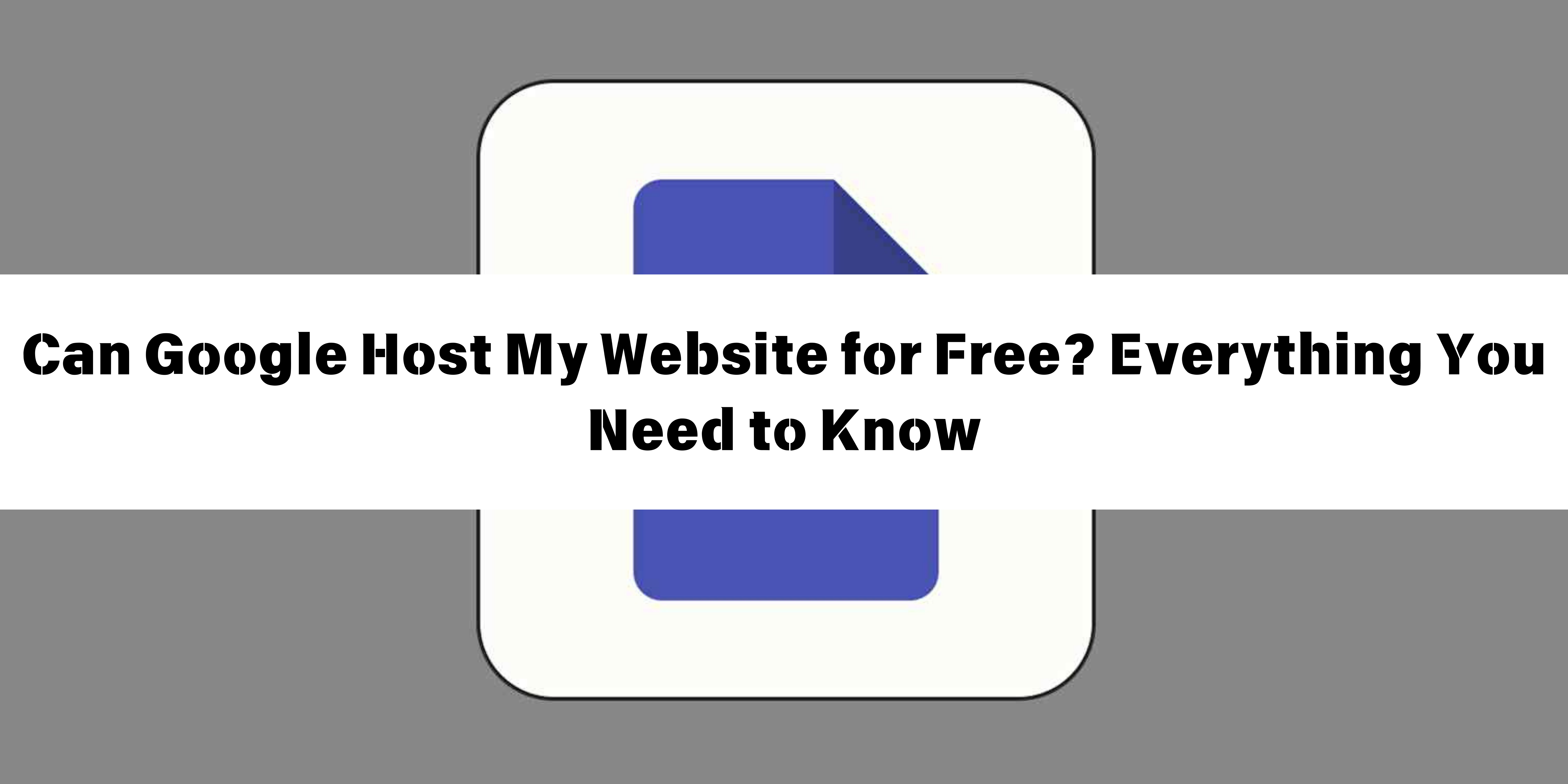
If you’re new to website building, you might be asking, Can Google host my website for free? Fortunately, Google offers several free hosting options that can be a great starting point for small projects. However, before you dive in, it’s important to understand the features, limitations, and when it’s time to consider paid alternatives. This comprehensive guide will answer that question in detail and help you make an informed decision.
What Is Google’s Free Hosting?
Google provides a range of services that allow users to host websites for free. These options vary in terms of functionality, ease of use, and customization. Let’s explore the main Google services that offer free hosting:
1. Google Sites: A Simple Website Builder
Google Sites is a free website builder that allows users to create simple websites without any coding knowledge. It’s great for personal projects, portfolios, and informational sites.
Key Features of Google Sites:
- Drag-and-drop builder: Easily add content without coding.
- Free subdomain: Websites hosted on Google Sites will have a subdomain (e.g.,
yourname.google.com). - Basic integration: Works well with Google Drive, Google Maps, and other Google Workspace tools.
- Limited design options: There are few customizable templates, and advanced styling is not possible.
Google Sites is great for those who need a basic website but may not meet the needs of those who require more customization or dynamic functionality.
2. Blogger: Free Blogging Platform
Blogger is another free hosting service from Google, designed specifically for bloggers and content creators.
Key Features of Blogger:
- Free subdomain: Your blog URL will include
blogspot.com(e.g.,yourblog.blogspot.com). - Customizable themes: Blogger offers basic themes, but you need coding knowledge for advanced customization.
- Monetization options: You can earn revenue from ads (e.g., AdSense) on your blog.
- Simple blogging tools: Includes an easy-to-use text editor and media upload options.
Blogger is ideal for personal blogs, but if you’re looking for a more professional or business-oriented blog, it may lack essential features.
3. Firebase Hosting: Free Hosting for Developers
Firebase Hosting offers a more advanced solution for developers, allowing for hosting of static websites and web applications. It’s perfect for those who are familiar with coding and want more control over their site.
Key Features of Firebase Hosting:
- Free SSL certificate: Your website will be secure with HTTPS encryption.
- Custom domain support: You can use your own domain name (e.g.,
yourdomain.com). - Fast performance: Firebase offers fast and secure hosting, especially for static content.
- Requires technical knowledge: Unlike Google Sites, Firebase is developer-focused and requires coding skills.
Firebase Hosting is best suited for developers, but if you’re a beginner looking for simplicity, it may not be the best fit.
Limitations of Google’s Free Hosting
While Google’s free hosting services are convenient, they come with limitations. Understanding these restrictions will help you decide whether free hosting is enough for your website.
1. Limited Customization and Design Flexibility
- Google Sites: Offers limited design customization, and you’re restricted to pre-built templates. Advanced customization (e.g., custom CSS or JavaScript) is not possible.
- Blogger: While you can customize themes, the extent of customization is limited unless you have coding skills.
- Firebase Hosting: Firebase is flexible but requires technical expertise, which may be a barrier for beginners.
2. Lack of Professional Features
- Google Sites: Does not support e-commerce functionality, advanced forms, or third-party app integrations.
- Blogger: Has limited tools for running a business or expanding your website. For example, there is no support for advanced marketing or e-commerce features.
- Firebase Hosting: While it offers more flexibility, it doesn’t provide easy-to-use tools for building a content-rich website or blogging platform.
3. Support and Resources
- Google Sites & Blogger: Both services offer limited support with no direct customer service. You’ll rely on community forums and help centers.
- Firebase Hosting: Firebase has a broader support community, but it is developer-centric, which may make troubleshooting challenging for non-technical users.
4. Scalability Issues
- Google Sites: Google Sites works for small websites but might struggle as your site grows. It lacks the flexibility to accommodate high traffic and advanced functionality.
- Blogger: Blogger can handle basic traffic but may encounter limitations as your blog grows, especially with respect to SEO and marketing features.
- Firebase Hosting: While scalable, Firebase is complex and better suited for developers who are building web apps rather than a simple website.
5. Free Subdomain Limitations
- Google Sites & Blogger: Both platforms provide a free subdomain (e.g.,
yourname.google.comoryourname.blogspot.com). However, if you’re looking to create a professional brand, using a custom domain (e.g.,yourname.com) is essential. This requires upgrading to a paid hosting service.
Can Google Host My Website for Free? Comparing Google’s Free Hosting with Paid Hosting
While Google’s free hosting services are convenient, they come with limitations. Here’s how Google’s free hosting compares to paid hosting solutions:
1. Performance and Speed
- Google’s Free Hosting: Reliable for small websites, but performance can suffer with high traffic.
- Paid Hosting: Providers like Bluehost, SiteGround, and HostGator offer faster speeds, better performance, and optimized infrastructure for handling high traffic.
Data: According to a study by Pingdom in 2023, the average load time for websites hosted on shared hosting plans (e.g., Bluehost, SiteGround) is around 1.2 seconds, while sites hosted on free services can have load times exceeding 3 seconds, especially during traffic spikes.
2. Customization and Control
- Google’s Free Hosting: Limited control over the website’s design, features, and performance.
- Paid Hosting: Full control over website customization, server settings, and third-party tool integrations.
Data: A W3Techs survey from 2022 found that 50% of websites using free hosting services reported limited customization as one of the primary challenges, compared to just 10% of those using paid hosting.
3. Security
- Google’s Free Hosting: Firebase provides SSL certificates for free hosting, but Sites and Blogger offer basic security features without robust protection.
- Paid Hosting: Paid hosts offer advanced security features like daily backups, firewalls, malware protection, and SSL certificates.
Data: A report by WPBeginner found that 45% of websites hosted on free platforms experienced security breaches in 2022, whereas only 12% of websites on paid hosting had similar issues.
4. Support
- Google’s Free Hosting: Minimal support with only community forums and help documents.
- Paid Hosting: 24/7 customer support via chat, email, and phone, with quick resolutions for technical issues.
Data: According to a 2023 survey by TechRadar, 72% of paid hosting users rated customer support as “excellent,” compared to only 15% for free hosting users.
5. Cost
- Google’s Free Hosting: Free, but comes with limited features and functionality.
- Paid Hosting: Hosting plans start at $2.95/month, offering a much broader range of features, scalability, and tools.
Data: HostingAdvice found that the average cost for paid hosting is around $3.50 per month for basic shared hosting. For less than the cost of a coffee, you can access premium features and support.
When Should You Consider Upgrading from Google’s Free Hosting?
If you’re currently using Google’s free hosting services, here are a few scenarios where it might be time to upgrade to paid hosting:
- Your website’s traffic grows: As your site gains more visitors, free hosting will struggle to handle the load. Paid hosting ensures better performance and scalability.
- You need more features: If you need e-commerce functionality, advanced forms, or integrations with third-party services, paid hosting offers these options.
- You want a custom domain: If you’re serious about branding and professionalism, a custom domain (e.g.,
yourname.com) is essential for your website’s success. - You require technical support: Paid hosting offers customer support to resolve issues quickly, ensuring your website remains operational.
Conclusion: Is Google Free Hosting Right for You?
So, can Google host my website for free? Yes, Google provides several free hosting services, including Google Sites, Blogger, and Firebase Hosting. These options are great for personal projects, blogs, and simple websites. However, as your website grows and your needs become more complex, you may find Google’s free hosting to be limiting.
For those who require more flexibility, professional features, and scalability, upgrading to a paid hosting service is the best choice. Providers like Bluehost, SiteGround, and HostGator offer faster speeds, more customization options, and greater security—along with the ability to handle high-traffic websites.
Ultimately, Google’s free hosting services are perfect for beginners or small projects, but if you’re serious about growing your website, it’s worth considering a paid solution for better performance and more features.






